Hideki Yukawa: The Legacy of Japan’s First Nobel Laureate in Physics
1. Introduction
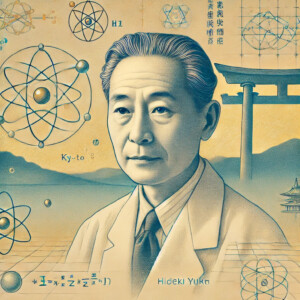
The year 1949 marked a historic moment for Japan. Physicist Hideki Yukawa became the first Japanese person to be awarded the Nobel Prize, recognized for his groundbreaking “meson theory,” which explained the forces within atomic nuclei. This theory provided the first explanation of the strong force that binds protons and neutrons together, etching Yukawa’s name into the annals of physics.
Yukawa’s research not only advanced Japan’s scientific and technological standing but also brought hope to a country recovering from the devastation of World War II. This article explores his life, his achievements, and the personal stories that shaped him, providing insight into one of Japan’s greatest scientific minds.
2. Early Life and Educational Background
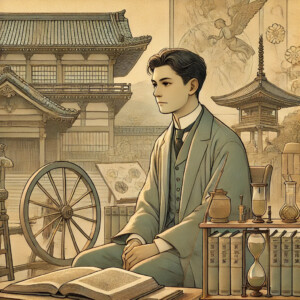
Hideki Yukawa was born on January 23, 1907, in Kyoto. His father, Hideyo Yukawa, was a scholar of philosophy at Tokyo Imperial University, and his mother, Koto, came from a family of physicians serving the Tokugawa Shogunate. Raised in this intellectually rich environment, Yukawa was influenced by both academic and cultural traditions.
As a child, Yukawa was known to be introverted, preferring to spend time reading rather than playing with other children. From an early age, he showed a strong interest in mathematics and physics, displaying intellectual curiosity beyond his years. This curiosity would eventually lead him to the abstract and complex field of physics.
In 1926, Yukawa entered the Third Higher School (now Kyoto University), where he began his formal journey into the world of physics. During his university years, he not only studied physics but also took a deep interest in philosophy and literature. He was particularly influenced by the renowned philosopher Kitaro Nishida, whose ideas on “absolute nothingness” and the unity of subject and object left a profound impact on Yukawa’s thinking. This philosophical grounding became a key element in Yukawa’s scientific approach, shaping the foundation for the development of his “meson theory.”
Thus, Yukawa’s approach to science was a unique blend of philosophy and physics, fostering an intellectual depth that allowed him to pursue profound questions about the nature of the universe. His constant quest to understand the fundamental mysteries of nature formed the bedrock of his later scientific achievements.
3. The Discovery of Meson Theory
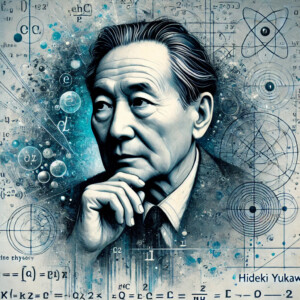
The discovery that immortalized Hideki Yukawa’s name was his “meson theory,” published in 1935. At the time, the mystery of how protons and neutrons were held together within an atomic nucleus puzzled physicists. Since protons are positively charged and should repel each other, their strong bond within the nucleus posed a significant challenge to explain. The force responsible for this bond, known as the “nuclear force,” was one of the key questions in physics.
Yukawa applied quantum mechanics to propose the existence of a new particle, which he called a “meson.” He theorized that this meson mediated the strong nuclear force between protons and neutrons, explaining their binding within the nucleus. The meson had a mass intermediate between that of protons and electrons, thus giving the particle its name, meaning “middle particle.”
Yukawa’s theory created a sensation in the physics community. It provided a simple yet elegant explanation of nuclear force and, most importantly, offered a model that could be tested experimentally. In 1937, Carl Anderson and his team discovered a new particle, the pi-meson, in cosmic rays, which provided experimental confirmation of Yukawa’s theory.
Yukawa’s meson theory opened a new chapter in physics, not only solving the problem of nuclear forces but also laying the foundation for the future of particle physics. His theory paved the way for further research into nuclear reactions, fusion, and eventually the development of the Standard Model of particle physics, which is still central to contemporary physics.
4. Nobel Prize Win
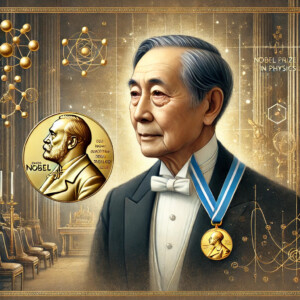
Hideki Yukawa’s accomplishments were internationally recognized when he was awarded the Nobel Prize in Physics in 1949. At the time, Japan was in the process of rebuilding after the devastation of World War II, and Yukawa’s award brought a sense of pride and hope to the nation. His Nobel Prize not only celebrated his individual achievement but also symbolized Japan’s emerging role in the global scientific community.
At the Nobel ceremony, Yukawa delivered a humble yet confident speech, emphasizing that “science transcends national boundaries and must serve the cause of peace.” He also touched on the moral responsibilities of scientists, particularly in the context of nuclear weapons development. His call for peace, amid growing concerns over the use of nuclear technology, resonated with many and reflected his deep concern for humanity.
Yukawa’s Nobel Prize became more than a personal accolade; it was a milestone for Japan as it sought to assert itself as a leading nation in science and technology. After receiving the award, Yukawa continued his research while fostering collaborations with scientists around the world and training the next generation of physicists.
5. Impact of His Research
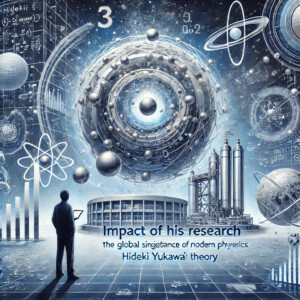
Hideki Yukawa’s meson theory had a profound impact on the field of physics. The discovery of the meson ushered in a new era in particle physics, laying the foundation for both theoretical and experimental advances. The verification of the meson’s existence not only deepened the understanding of nuclear forces but also contributed to the development of the Standard Model, which later led to the discovery of even smaller particles such as quarks and gluons.
Yukawa’s theory advanced not just theoretical physics, but also the broader field of science and technology. The understanding of nuclear forces played a key role in studies related to nuclear energy and nuclear reactions. Furthermore, his work had significant applications in astrophysics and quantum mechanics, pushing forward new lines of inquiry in modern physics.
Beyond physics, Yukawa’s commitment to pursuing the fundamental mysteries of the natural world inspired many future scientists. His approach to research, which blended scientific rigor with philosophical inquiry, became a model for the next generation of physicists. Notably, Japanese physicists such as Makoto Kobayashi and Yoichiro Nambu, who also went on to win Nobel Prizes, built on the groundwork Yukawa had laid in particle theory.
Yukawa’s contributions extended beyond his technical achievements. His ethical stance on the role of science in society, particularly in the context of nuclear weapons, left a lasting legacy. He firmly believed that scientific progress should be used for the benefit of humanity, a philosophy that continues to influence discussions about the responsibilities of scientists today.
6. Yukawa’s Personality and Anecdotes
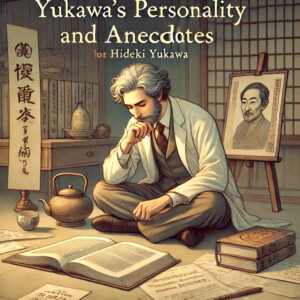
Despite his monumental achievements, Hideki Yukawa was known for his humility and modesty. His students and colleagues often described him as someone who never sought authority or prestige but remained wholly committed to the pursuit of scientific truth.
One famous anecdote reflects Yukawa’s modesty even after receiving the Nobel Prize. He remarked that his theory still had many incomplete aspects, showing that he did not rest on his laurels, but instead remained committed to advancing his research. This humility made a deep impression on his students and mentees, many of whom would go on to become prominent scientists in their own right.
Yukawa also had a deep interest in philosophy and literature, which influenced his outlook on science. In his letters to his wife, Sumi, he frequently quoted literary works and poetry, demonstrating the breadth of his intellectual curiosity. Yukawa believed that science was just one tool for understanding the universe, and he was equally interested in humanity’s spiritual and intellectual development.
In post-war Japan, Yukawa took on an important societal role as well. As the threat of nuclear weapons grew, he became actively involved in peace movements. He believed strongly that science should be used for peaceful purposes and advocated for the abolition of nuclear weapons. His participation in international peace conferences and his speeches on the ethical responsibilities of scientists made him a respected figure not just in academic circles but also among peace activists.
Yukawa’s gentle demeanor and intellectual depth left a profound impact on his students. His laboratory at Kyoto University became a nurturing environment for many future physicists, who revered him not only as a brilliant scientist but as a compassionate mentor. His personal integrity and kindness inspired generations of scholars to follow his example.
7. Later Years and Legacy
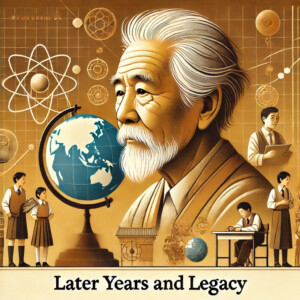
After receiving the Nobel Prize, Yukawa returned to Kyoto University, where he dedicated himself to mentoring young physicists and advancing their research. He encouraged his students to pursue scientific inquiry with the same philosophical depth and international outlook that had shaped his own career. The Yukawa Laboratory at Kyoto University became a hub of intellectual exchange, producing many physicists who would go on to achieve international acclaim.
In his later years, Yukawa became increasingly involved in efforts to promote global peace, particularly in the context of nuclear disarmament. He participated in the Pugwash Conferences, which brought together scientists and public figures to discuss solutions for reducing the threat of nuclear weapons. Yukawa’s belief that “science should serve humanity’s peace and prosperity” became a central theme in his public speeches and writings.
Yukawa also continued to explore philosophical questions about the nature of existence. In his later writings, he often addressed topics that transcended the boundaries of physics, such as the role of humanity in the universe and the limits of scientific knowledge. These reflections influenced many in the scientific community, and his works continue to be studied for their philosophical depth.
Hideki Yukawa passed away peacefully in 1981. His later years were marked not only by his scientific achievements but by his efforts to promote peace and his engagement with deeper philosophical questions. He left behind a legacy as a scientist who understood the power and responsibility that comes with knowledge, and as a man who believed in the moral duty of scientists to contribute to a better world.
8. Conclusion and His Legacy
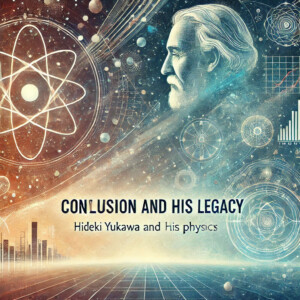
Hideki Yukawa’s achievements remain central to modern physics. His meson theory continues to be a cornerstone of particle physics and has paved the way for decades of research in nuclear interactions and particle behavior. His contributions to the scientific world, however, extended far beyond his theories. Yukawa’s advocacy for peace and his commitment to ethical responsibility in science remain deeply relevant in today’s world, where nuclear weapons and the ethical use of technology continue to be pressing global concerns.
Yukawa’s name is renowned both in Japan and internationally, and the impact of his work and philosophy continues to influence future generations of physicists. His scientific discoveries were not just academic achievements—they were profound contributions to humanity’s understanding of the universe and its fundamental forces. His legacy is one that bridges the gap between science and society, reminding us that scientific exploration must always be pursued with both curiosity and conscience.
Yukawa’s relentless pursuit of truth and his belief in the peaceful application of science offer timeless guidance as we continue to face the challenges of an ever-changing world. His work serves as a testament not only to the progress of science but to the enduring value of intellectual and moral integrity.
Comment